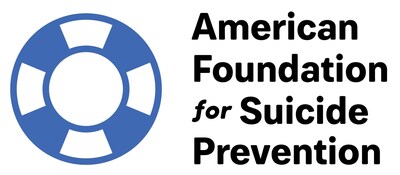WASHINGTON, June 25,
2024 /PRNewswire/ -- The American Foundation for
Suicide Prevention (AFSP) commends U.S. Surgeon General
Vivek Murthy for releasing a new
advisory today: Firearm Violence: A Public Health Crisis in
America. Tragically, suicides by firearm comprise more than half
(55% in 2022) of all suicide deaths in the United States. AFSP encourages several
community-based approaches to prevent firearm suicide, several of
which are reflected by the Surgeon General's advisory, as well as
the 2024 National Strategy for Suicide Prevention. These
approaches must include collaborative suicide prevention education
efforts within gun-owning communities.

Research shows that the risk of suicide is greater when firearms
or other lethal means are present in the home or readily
accessible. Ensuring that a person at acute risk for suicide does
not have easy access to a firearm saves lives; research has
consistently shown that when a chosen method of suicide is not
accessible, most individuals will not move on to another method of
suicide and if they do, it is less likely to be lethal. In
addition, suicidal urges can intensify quickly so easy access to
lethal means can be fatal; putting time and space between a person
in crisis and lethal means allows time for the acute urge to pass
and for the person to engage with healthy coping strategies.
AFSP strongly encourages further support at the state and
federal levels of government for legislation, policies, funding and
executive action to prioritize firearms-related research, provide
education on the relationship between suicide and firearms,
implement voluntary firearm removal initiatives, expand lethal
means education and counseling practices within healthcare systems,
and increase access to mental health, substance use, and
trauma-informed care. These include:
- Continued investment in mental health and crisis care
services. AFSP urges lawmakers at the state and federal levels
to prioritize sustained investment in mental health services and
crisis care support. This includes the need for full implementation
of the Bipartisan Safer Communities Act which will save lives,
including through the expansion of school-based mental health
services and professionals.
- Training for healthcare professionals on lethal means safety
counseling, screening for suicide risk, and making referrals to
mental health resources and care. Individuals with heightened
risk for suicide are often seen in clinical settings, particularly
emergency departments. Incentivizing health systems to implement
suicide prevention protocols, including training health
professionals to identify, support, and provide referrals for
patients who may be at elevated risk will help save lives. When a
patient's suicide risk is detected if the patient has access to a
firearm in the home, healthcare professionals should work with the
patient and their family when possible on voluntary strategies to
store household firearms away from the home, or otherwise ensure
secure firearm storage, until the patient recovers.
- Public investments to support research regarding firearms
and suicide prevention. More data are needed on which firearm
policies are most effective in preventing suicide, which
educational efforts are most effective in promoting secure firearm
storage, and how best to bring promising practices to scale so we
can implement more widespread change nationwide. This includes
AFSP's strong support for continued federal investment in gun
violence prevention research.
- Community storage options and temporary transfer
exceptions. When an individual is at risk for suicide, being
able to store firearms outside the home can save lives. This
includes storage options at gun shops, shooting ranges, police
departments, community lockers, and other special storage
facilities. To support the ability for an individual in crisis to
store their firearm outside the home, AFSP supports temporary
transfer exceptions in background check laws in cases of suicide
risk.
- Voluntary do-not-sell list programs. These are lists
where individuals can register themselves to voluntarily restrict
their own ability to purchase and/or own a firearm. Only the person
in question can enter themselves onto such a voluntary do-not-sell
list, and the list is used for no other purpose than for firearm
purchases or firearm ownership. AFSP supports the establishment of
voluntary do-not-sell lists at both the state and federal levels
and commends the multiple states that have successfully established
voluntary do-not-sell lists.
- Laws that call for the creation and dissemination of
educational materials and/or training on the relationship between
access to lethal means and suicide prevention, and secure firearms
storage. These include efforts to publish and distribute
brochures on firearms safety and suicide prevention, distribute
secure firearm storage devices, educate firearms instructors and
clinicians in lethal means safety, and to put suicide prevention
information on firearm warning labels and on the premises of
licensed firearm dealers.
- Extreme risk protection orders. AFSP urges policymakers
at all levels of government to support policy initiatives to allow
for extreme risk protection orders (ERPOs) to be used as a tool to
help prevent suicide when voluntary efforts to separate an at-risk
individual from firearms are unsuccessful or impossible and suicide
risk is imminent.
AFSP appreciates the Surgeon General's leadership, and we look
forward to working alongside our chapters, partners, and
policymakers to promote the advisory and save lives.
The American Foundation for Suicide Prevention is dedicated
to saving lives and bringing hope to those affected by suicide,
including those who have experienced a loss. AFSP creates a
culture that's smart about mental health through public education
and community programs, develops suicide prevention through
research and advocacy, and provides support for those affected by
suicide. Led by CEO Robert Gebbia
and headquartered in New York,
with a public policy office in Washington, D.C., AFSP has local chapters in
all 50 states, D.C. and Puerto
Rico, with programs and events nationwide. Learn more about
AFSP in its latest Annual Report and join the conversation on
suicide prevention by following AFSP
on Facebook, Twitter, Instagram, YouTube,
LinkedIn and TikTok.
Media interested in comment on this news are encouraged to fill
out this press request form and review AFSP's Ethical
Reporting Tips.
 View original content to download
multimedia:https://www.prnewswire.com/news-releases/american-foundation-for-suicide-prevention-statement-on-firearm-violence-public-health-advisory-302182152.html
View original content to download
multimedia:https://www.prnewswire.com/news-releases/american-foundation-for-suicide-prevention-statement-on-firearm-violence-public-health-advisory-302182152.html
SOURCE American Foundation for Suicide Prevention